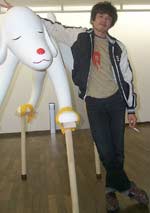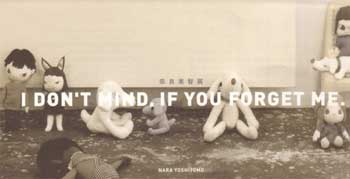by Tim Law
"I think I have a background to people of my generation who can't articulate or don't want to articulate their feelings. I'm in a position to do that visually the way, for example, Kurt Cobain did it in music," Nara described his societal position in the Knode interview. "I'm creating this generation that has no power. I'm articulating or producing a scream for them. Kurt Cobain was not making songs to give hope; he was just simply articulating that generation's scream. They understood this in a deep way, they rejected other music because it seemed like such a lie." Koichi Kawasaki, a curator of the Museum of Art and History in Ashiya, Hyogo Prefecture, attributes the generational understanding to Nara's success. "Modern art is often considered something abstract and hard to understand, but the recent viewers wanted something more familiar," said Kawasaki in the Asahi Shimbun. "Nara's girls are not just cartoon-like ones... When viewers see the girls' expressions, they feel the girls could be anyone, and the feeling evoke viewer's sympathy."
The generation typically viewing and "understanding" Nara's work is a generation super-saturated with anime and manga, no longer living with your typical Jungian collective unconsciousness, but an all "new and improved" cultural database. Drawing from their unconscious lives surrounded by Space Battleship Yamato and Di Gi Charat as well as lonely childhoods, Nara's generation can all tap into their own feeling through Nara's works. The generation may be raised on anime and manga, and they may have angsty cries they can work out through Nara's art, but ultimately the work of Nara simply is that cultural database. Nara often receives homemade stuffed animals designed after his works and notes intimating, "I know exactly what you're saying," prompting him to wonder if his fans understands his own works better than he does. |
||||||||
|
All works © Yoshitomo Nara.
|


